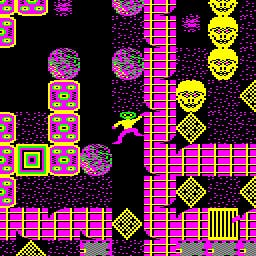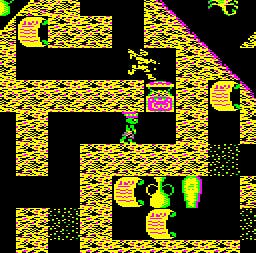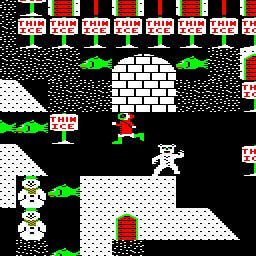Ed Howson of Masabi
Interview - Mobile Repton's developer talks about the latest generation of mobile phones, and why we should be excited about them
Last week we spoke to Ed Howson of Masabi about their new hand-held version of the classic BBC Micro platform puzzler Repton. Today we take a wider look at the state of the mobile phone industry, how gaming fits in, and why we should all replace our creaky old handsets with the next generation of Java-compatible phones due out later this year.
Ancient Chinese Curse
"It's fair to say that the mobile phone industry has been going through some interesting times recently. There's been a lot of scepticism about future technologies since the debacle that was WAP, and massive 3G license fees have been paid out by the networks."
"People keep hearing hype about new technologies and are then obviously disappointed when they fail to deliver on these promises. The reality is that mobile phones in this country have barely progressed over the last few years; they've shrunk a little and got sexier cases, but once you've got one you only really think about upgrading when the old one breaks."
"I think this will change as soon as the new wave of colour phones hit. People are going to be blown away when they see what a great leap forward a device like the Nokia 7650 is over what they have become used to. The wireless market is going to be getting a lot more attention. After all, at a hardware level there's not a huge difference between a Gameboy Advance and a top-end phone, except how they connect to the outside world. They're both just ARM chips strapped to colour screens."

Now In Colour
"Masabi formed around the idea that gaming will play a central role in the next generation of mobile devices", Ed explained. "Gaming will be a key driver [of sales], and the games which are the most successful are going to be those which allow users to connect and interact with other players. We are aiming to do this with our conversion of Repton and our future projects."
Mobile phone games have generally been fairly primitive affairs in the past, from the ubiquitous Snakes to SMS-based quiz games, recreations of old text adventures and turn-based titles with fuzzy monochrome graphics. The new wave of handsets that is about to arrive in Europe could change all of that.
"I've long been a believer in the potential for these next-generation Java-enabled colour mobile handsets to break out as great gaming platforms. There have been some good attempts to make entertainment software with the current technology (WAP and SMS), but fundamentally I think everyone knows that these are limited gaming platforms based on technology that can't be stretched very far. I know a guy who couldn't be prised away from Merchant Princes for weeks, so the potential is there, but I think phones need a real programming platform - Java ME - and attractive colour screens to break out of the niche in the games market that they currently occupy."

Limitations
Using Java ME gives developers a better platform on which to base their mobile games, but it's not without its problems. "Java is great to work with, however it was originally a challenge to achieve the highest performance on all systems, because the current base-line J2ME MIDP profile does not support high-speed graphics or sound, [which are] found on the majority of the Java phones which are soon to become available."
"Despite this, we were stubborn and really wanted to get [Repton] fast and playable on as wide a range of phones and PDAs as possible. It has been quite challenging at times. For instance the original BBC Micro version could directly manipulate the video memory base address to scroll in four directions instantly, which you naturally cannot do on a phone operating system that runs other windows and tasks at the same time. Fortunately the power of these phones means we have managed to squeeze in the right performance to make it match the original."
Another challenge which faces developers is the relative lack of free memory and storage space for downloaded games on mobile phones. "This lends itself perfectly to our concept of a free game core that can be passed round easily and left on the phone as long as you want", according to Ed. "Then we make use of the existing billing arrangement to charge you for the [extra] levels that you want, when you want them. Contrast this with both the conventional model [of buying a whole game at one go], which requires more commitment before you buy the game and more precious space on your phone once you've got it, and also the arcade-style model being touted by analysts such as Ovum recently, which would charge you every time you play the game, even though you only had to download it once."

Retro Revival?
This new generation of mobile devices should open up a whole range of new possibilities for handheld gaming, but despite this potential, many developers (Masabi included) are rehashing old 8 bit games for the new platforms. Is there a danger of flooding the market with retro remakes, as has happened with the GameBoy Advance?
"Certainly I think this is a great risk. I played a space trading game 'inspired' rather heavily by Elite on a Palm Pilot recently, and it's impossible to control. Many people have mentioned Elite as a top contender for conversion, but remember [when you play it] you're using six keys regularly just for movement and another six at least for other functions. You just can't do that on a PDA or phone! Likewise, Doom on the Nokia 9210 Communicator was technically very impressive, but I must confess I had no idea what was going on; it just doesn't suit the form factor."
"I'm afraid to say that we'll probably be seeing a mixed bag of conversions - some stunning, some quick cash-ins. I think the same will be true with the original titles developed for the platform. The key differentiator here is going to be how hard the developers have thought about the platform and their target audience. With Repton, we've taken a great core game and made every effort to keep the gameplay that made it special. But behind this, we've adapted it to work with the restrictions and unique capabilities of these connected devices."
Conclusion
With ever more powerful hardware, colour displays and the ability to download new games and levels on the move, the next generation of mobile phones could bring about a long-awaited revolution in handset gaming. For now at least it seems unlikely that your mobile is going to be replacing your GameBoy Advance, but the next few years are going to be an interesting time for handheld gaming as new formats emerge.







